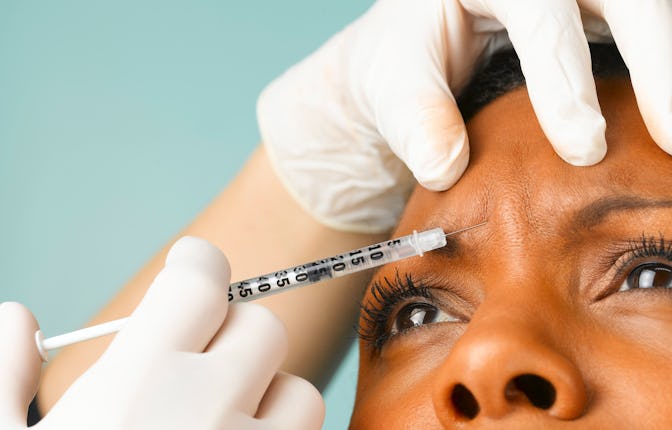Botox could help your anxiety, according to a new study
Scientists have discovered another potential use for the already versatile injectable.

While perhaps best known as a wrinkle-smoothing Real Housewives staple, Botox also happens to be an incredibly versatile drug, approved to treat ailments ranging from chronic migraines to excessive sweating. A new study suggests that it may help treat yet another, pervasive condition: anxiety. Participants injected with Botox at four different sites reported anxiety significantly less frequently than those who got different treatments for the same conditions, according to a UC San Diego Health press release. The findings appeared today in the journal Scientific Reports.
A team led by Ruben Abagyan, a professor at UC San Diego’s Skaggs School of Pharmacy and Pharmaceutical Sciences, analyzed the FDA’s Adverse Effect Reporting System (FAERS) database, which consists of reports from nearly 40,000 patients about what happened to them after their Botox injections, the release explained. The researchers decided to home in on beneficial effects instead of harmful ones.
Specifically, they compared how often patients who received Botox reported a lack of anxiety and anxiety-related disorders, or a reduced frequency of them, to how often patients who underwent different treatments for the same conditions did, per the UC San Diego press release. Next, they used an algorithm to determine whether any of these differences were statistically significant.
Abagyan and his team saw a 22% to 72% lower risk of reported anxiety in patients who got Botox at four injection sites, each for different conditions: facial muscles for cosmetic use; upper and lower limbs for spasm and spasticity (when muscles stiffen, impairing movement); facial and head muscles for migraine; and neck muscles for torticollis (a twisting of the neck that cranes the head to one side).
The study comes with some caveats, though, as the release points out. For instance, the FAERS data includes only Botox recipients who had negative side effects. And most importantly, the researchers didn’t conduct the study for the express purpose of investigating the association between Botox and anxiety. A rigorous trial that compared anxiety symptoms in people assigned to receive Botox to those who received a placebo would’ve allowed them to draw a stronger correlation.
At this point, it’s not clear how Botox — made from the same toxin that causes botulism, administered in small doses — might relieve anxiety, but the researchers think the neuromuscular junctions targeted by Botox could communicate with the brain, per the press release, or the botulinum toxins might migrate to parts of the central nervous system that play a role in emotions. Plus, it can treat chronic conditions that fuel anxiety.
Given that anxiety negatively impacts 32% Americans at some point in their lives — and treatments fail to work for nearly a third — according to the National Comorbidity Survey Replication, I’m down for exploring new therapeutic avenues, and all the more so if they can give me the ageless J.Lo skin of my dreams.